- Home
- Victor Gischler
Go-Go Girls of the Apocalypse: A Novel Page 5
Go-Go Girls of the Apocalypse: A Novel Read online
Page 5
“No.”
“It happens.”
“A toothless old lady wanted me to fuck her.”
“You need a drink.”
“Yes.”
Emile the neon maître d’ returned with a bottle of vodka and two mismatched glasses. He poured as he bowed. He was obsequious as hell. “The waitresses have yet to come on duty, but it is my delight to bring your bottle myself so you don’t have to wait.”
Mortimer tossed back the vodka. It burned his throat. He tried to thank the maître d’ but erupted into a coughing fit instead.
“Mort says thanks, now fuck off,” Bill told Emile.
Emile left the bottle on the table, rolled his eyes as he walked away.
“This tastes like kerosene,” Mortimer said.
“Don’t be ridiculous. Did you ever drink kerosene before?”
Mortimer admitted he hadn’t.
“Then don’t talk crazy.” Bill tilted the bottle, filled up Mortimer’s glass again.
They both drank, winced, filled their glasses again.
“I don’t know where my wife is,” Mortimer said. “If she’s even alive.”
Bill nodded, slurped booze. “It’s tough to keep track of kinfolk in the new world.”
Kinfolk. Bill’s cowboy act got cornier the more he drank. Mortimer didn’t mind. He liked Bill. He liked drinking with someone again. If he let his eyes glaze over and listened to the music and forgot how toxic the vodka was, Mortimer could almost believe he was enjoying happy hour after work with coworkers from the insurance company, that he’d go home a little drunk, make love to his wife. Anne. Where was she?
He grabbed the bottle. Shook it. Empty. “Damn.”
Bill snapped his fingers. “Another bottle, you greasy bastard!”
Emile returned. A frown had replaced his strained smile. He wasn’t even pretending anymore. “What?”
Bill returned the frown. “Keep a civil tongue, you…you…”
“Varmint,” Mortimer suggested.
“Yeah! You motherfucking varmint asshole.”
“What do you want?” demanded Emile. His moustache had drooped. The maître d’s haughty air had been completely defeated by the Platinum card. All he could do was endure.
“Booze!”
Emile slunk away, and Mortimer watched him go. He couldn’t summon any pity for the man. Mortimer was too wrapped up in his own thoughts, too enamored by the fuzzy Christmas tree lights, too light-headed from the vodka. What would he do now? How long could he sit here drinking poison before he was forced to determine what happened next? Mortimer Tate had not considered what his life would be at the bottom of the mountain.
Emile paused to talk to a skinny, dark-eyed man leaning in the doorway. Mortimer thought him familiar. Emile nodded at the newcomer, pointed toward Mortimer’s table. Had Buffalo Bill’s rude behavior caused trouble? Where the hell was that bottle? Mortimer still thought the skinny man looked somewhat familiar.
“Your wife might not even be alive,” Bill said.
Mortimer flinched at the statement. “What?”
“I remember getting lost in the food riots back then. It was rough. I found my way home, found my dad in the living room, blood all over the place. Somebody had smashed his head in with a pipe or something. The house had been ransacked. I waited and waited by his body for my mom to come home, you know? I never did find out what happened. Never.” Bill’s eyes were focused someplace far away, years into the past. “I thought later, you know, what if she’d come home and found Dad dead? What if she’d just left and saved herself and didn’t wait for me? I always thought—” Bill’s voice caught; he shook his head, cleared his throat. “Where’s that fucking bottle?”
Emile came back just in time, filled their glasses from the new bottle. Bill drank quickly, eyes down, face clouded with dark memories.
Mortimer could see Bill didn’t want to talk about it, but Mortimer couldn’t help himself. He peppered the cowboy with questions. How many had died? Was anything being done? What was this world they now lived in? Did people still vote? Was there still an America? The answers were all the same. Everything had changed.
Emile bent to speak softly into Mortimer’s ear. “Professor Coffey wonders if he could join you for a drink.”
Mortimer lifted an eyebrow. “Who?”
“The owner, sir.”
“Uh…okay.”
The name, the face. So damn familiar.
The lanky man came over and sat in between Bill and Mortimer. “Hello, Mort. I thought it was you.”
Recognition snapped into focus. “Pete Coffey!”
Bill raised an eyebrow.
“This is Pete Coffey,” Mortimer said. “We were on the baseball team in high school together.”
Bill nodded. “How do.”
“Last I heard you were an English professor at Georgetown.”
Coffey shrugged. “I taught classics. Georgetown is radioactive rubble now. I was home for my mother’s funeral, or I’d have bought it with the rest of my department.”
“I’m sorry to hear it,” Mortimer said. “Your mother, I mean.”
“It’s okay.”
“You’re the owner of this place?”
A smile flickered across the professor’s face. “Half owner. Joey Armageddon owns half of all the places. Some local guy—in this case, me—owns the other half.”
“Where’s the government?” Mortimer blurted.
“Once in a while we get something on the short-wave,” Coffey said. “Some air force general in Colorado Springs claims to represent the government. Then other times we hear about some low-level cabinet secretary holed up in Omaha saying she’s constitutionally in charge.” A shrug. “It doesn’t really matter.”
“Doesn’t matter?” Mortimer poured vodka, shook his head. “I can’t believe it.”
“You’re drinking that?” Coffey asked.
“It’s—hic—good,” Bill said.
“No, it’s not,” Coffey said. “It’s a shortcut to the Hershey squirts. Like washing out your bowels with battery acid.” He waved at Emile, and the maître d’ was at Coffey’s elbow in an instant. “Bring the Bombay from the safe in my office. And the lime juice. Silas knows the combination.”
Bill gaped. “You got limes? Where’d you get limes?”
“Nobody has limes,” Coffey said. “We got six little cans of lime juice in trade last month, and I’ve hoarded them for myself. The Bombay too.”
“I miss oranges.” Bill sounded wistful. “Any citrus.”
“Nothing comes up from Florida,” Coffey said. “Not for a year now.”
Emile arrived with a half-full bottle of Bombay Sapphire, a can of lime juice and a bucket of ice cubes. Coffey mixed the drinks, poured the gin like he was handling nitroglycerin, careful not to spill a drop. He made sure not to pour Bill or Mortimer any more than he poured for himself. At last, they drank.
Contented sighs. All three men closed their eyes, let the booze ease down.
“Damn, that’s a hell of a lot better than the vodka, all right,” Bill said. “I don’t feel like I’m going to die at all.”
They sat quietly. The gin demanded respect, so they sipped, didn’t talk. Mortimer glanced around; more patrons had crowded into Joey Armageddon’s. The song playing now was “Things to Do in Denver When You’re Dead” by Warren Zevon. Above the stage, men lowered what looked like shark cages on steel cables. The Christmas tree lights began to blink. Mortimer noticed something else. Something important.
Women.
Scantily clad women moving among the tables, taking drink orders. Some wore tank tops with the hems tied into a knot above the navel. Others wore bikini tops or lace bras. Tight cutoff jeans seemed to be standard.
Mortimer Tate had not had a woman in nine years. Something stirred in his pants, fluttered in his gut. He gawked openly.
Coffey told his story. He’d survived the worst times, helped hold the town together. It was a small town, people knew one another. They’d band
ed together, fended off marauders from without, despair from within. Coffey was mayor now. More important, he was half-owner of the Spring City Joey Armageddon’s. He might as well have been royalty.
“Anne,” Mortimer said. “Is she…do you know what happened to her?”
Coffey nodded slowly. “Of course. I’d forgotten. Naturally you’d want to know. Sorry, Mort. I really am.”
Oh, no. Mortimer’s heart froze. She’s dead. How? What happened?
“I’m truly sorry,” Coffey said again. “But I had to sell her.”
“No, no, no. It can’t be true. It can’t….” Mortimer blinked. “Did you say…sell her?”
“Hey, it wasn’t my idea,” Coffey said. “Believe me, I wanted to keep her. The customers loved her. She could really shake her ass in the cage.”
It was reflex. Mortimer shot out of his chair, knocked it over behind him. His fists came up. This son of a bitch was talking about his wife.
Mortimer froze when he felt the cold metal under his right ear. He turned slightly, saw the big man with the shotgun pushed up against him. Where did he come from? He felt something else sticking hard into his ribs on the left side. He unclenched his fists and held his hands up. “No problem here.”
“Let’s have a seat, sir. Nice and calm.” It was Emile, who held a small silver revolver against Mortimer’s ribs. “There’s a good gentleman.”
Mortimer eased down, and somebody slid his chair underneath him.
Emile looked at his boss, raised an eyebrow.
“I think we’re okay here,” Coffey said. “Mort, you’ll behave, right?”
Mortimer nodded, his teeth clenched. The gunmen withdrew. Bill eased his grip on one of the six-shooters. Mortimer noticed Coffey’s fist on the table next to his drink. It clutched a little nickel derringer. The saloon owner slowly tucked the pistol back into his belt.
“That was insensitive,” Coffey admitted. “I forgot you don’t know how things work now.”
Mortimer glared outrage. “Selling women as sex slaves? Is that how it is?”
“Don’t think of it that way. It’s like when the Red Sox trade an outfielder to the Yankees. The new location needed an experienced girl. Anne was happy, Mort. It was a promotion.”
“Where did she go?”
“I don’t know.”
“You’re a liar.”
Coffey frowned, sighed. “I’m going to try to understand how you feel. I’m going to overlook that you’re rude.”
“Kiss my ass.”
Coffey sighed and stood. “Things have changed, Mort. Adjust.” The Christmas lights went wacky, and the music cranked a notch. “Looks like the show’s about to start,” Coffey said. “You boys enjoy. I have to make the rounds. Check with you later.”
The shark cages lowered from the ceiling, and the music boomed. “Raspberry Beret.” There were women in the shark cages. Dancing women.
Naked women.
They thrashed and shook and tossed their hair, an hourglass blonde with big tits in the close cage. Across the stage in the other cage a willowy, athletic redhead undulated and twisted. Joey Armageddon’s had filled with hooting, drunken men. It had become hot, a musty, boozy smell filling the place, mixing with musk and tobacco smoke. Mortimer’s head swam. Sensory overload. He fumed, but naked women demanded his attention. He reached for his glass of gin, found it empty. The Bombay had disappeared, replaced by another bottle of the lethal vodka.
Mortimer drank. The world blurred.
He heard Bill shouting at him; his voice seemed so far away. Mortimer squinted, looked at the cowboy. One of the waitresses had found her way into Bill’s lap. “What?”
“I said loan me some of them Armageddon dollars,” Bill shouted.
Mortimer went into his pockets, came out with a handful of coins and shoved them across the table. He reached for the vodka bottle, couldn’t quite grab it. His depth perception was in the toilet.
Mortimer felt himself floating, felt he was leaving his body, drifting amid the swirling colors of the Christmas tree lights. He could not make his eyes focus, could not hear specific sounds, the noise and music and conversation all boiling into a single, messy soup. But on some level his brain was working, reaching a new plateau of knowing and understanding and determination. He knew what he would do. He was having an epiphany, a spiritual awakening.
He glanced again at Bill, made his eyes focus. Bill had the waitress’s top down, one erect nipple in his mouth. The waitress’s hand reached below the table into Bill’s lap, pumped.
To hell with spiritual awakening, Mortimer thought. I want a hand job.
XII
In his dream, Mortimer smelled coffee.
His eyes flicked open. He rolled over, heaved, launched a stream of acidic puke over the side of the queen-size bed. He lay back, sank into the pillow. Where was he? He tried to focus. Gnomes with miniature sledgehammers were trying to pound his eyes out of their sockets from the inside. He felt like unholy shit. Perhaps if he puked again…
He rolled over. Puked again.
The smell of puke made him puke a third time.
Beyond the sour smell of vomit, Mortimer could have sworn he still smelled coffee. Wishful thinking. A nice dream.
Bill burst into his room, holding a ceramic mug. “Wake up, sunshine. Time to—Jesus H. Christ, what happened in here?” He went immediately to a window and opened it wide. The cold wash of air took some of the stench away, felt good on Mortimer’s slick face.
Mortimer summoned the energy to say, “Go away. I’m dying.”
“If you die, you’ll miss the train.” Bill shoved the coffee mug at him. “Drink this. You paid enough for it.”
Mortimer struggled, grunted, sat up in bed. “What are you talking about?”
“When you bought all that stuff last night. You got some coffee too. Three hundred bucks a pound.” Bill shook his head, laughed. “I guess there ain’t no more bean boats coming up from Colombia.”
Three hundred dollars a pound for coffee? Bill had said he’d bought some things. Mortimer had been so very drunk…had spent so much…had Bill said…? “What train?”
“It was your idea. When Mr. Coffey came back and said he knew where your wife—”
“Anne! You know where my wife is?”
“Hell, you really don’t remember, do you?”
“God damn it, Bill!”
“Mr. Coffey said he felt bad so he asked some questions and found out your wife went to Chattanooga, to the main Joey Armageddon’s there. She’s going to be head girl or something.”
“Christ.”
“So you said you were going to get her and bought a bunch of supplies, ammunition and food, and you booked us passage on the Muscle Express.”
“The muscle what?”
“The train.”
Mortimer looked around the room. He remembered a blur of women, half expected to see one in his bed. “Did I have any company last night?”
“Well, you could have,” Bill said. “When they all found out you were the richest guy in the place, you became right popular. But you drank so much. I don’t think you could’ve gotten Mr. Willie to work.”
Damn.
Bill lifted the mug again. “This is getting cold. You want it or not?”
“Hell yes.” Mortimer took the mug. “I paid for it.”
His sipped the coffee. Mortimer’s eyes slowly widened. Every molecule in his body came alive. His bones hummed with electricity, the caffeine flowing the pathways of his body, a latent memory in his veins moaning ecstasy, seeming to say, Oh, yes. This is good. This is right.
Bill looked alarmed. “You okay, man? What is it?”
Fat tears rolled down Mortimer’s cheeks. “Could you leave the room please, Bill? I’d like a moment alone with the coffee.”
Once upon a time it had been a whistle stop, an insignificant knot in the great tangle of the American railway. Now, like a thriving port in the endless deserts of the old west, the Spring City train station w
rithed with activity, a score of stout men loading crates of trade goods (including three hundred gallon-jugs of Freddy’s Stain Your Tongue Purple Merlot). The very few passengers who could afford the fare disembarked, looking sore-limbed and happy as hell to be off the train.
The only two people who could afford the fare south were Mortimer and Bill. They stood in the snow next to their gear, hands in pockets, stomping to keep their feet warm. Mortimer swayed in the biting wind, only the caffeine in his veins keeping him upright. His finger stump ached with the cold.
Silas Jones found them, puffing and red faced. He’d run all the way to the station. “I thought I might miss you before the train left, sir. Thank goodness I caught you.”
Mortimer belched, and it tasted like death. “What is it?”
Jones presented him with a sheet of paper marked up in pencil. A row of numbers swam before Mortimer’s eyes. He looked away. Reading the numbers made him nauseous. “Just give me the gist of it.”
“Your final bill,” Jones said, handing Mortimer a pen. “If you’ll just sign at the bottom, we’ll deduct it from your account.”
Mortimer took the pen, glimpsed the total at the bottom of the page as he signed. He gulped. Mortimer had spent over two thousand dollars. His newfound wealth would evaporate in a week if he kept spending at this pace. He mentally vowed not to let that happen.
Pete Coffey appeared at Mortimer’s elbow. “You look green.”
“Don’t worry about me,” Mortimer said.
“I hope you find her,” Coffey said. “Seriously.”
“You didn’t have to come see me off.”
“I didn’t. I’m mayor, remember? I always make sure the train goes out on time. I also want to make sure my boys get aboard.” Coffey indicated a dozen men climbing aboard the flatcars. All held rifles and looked ready to use them.
“Red Stripes down the line, maybe. Can’t take chances.”
Mortimer touched the Uzi hanging from its shoulder strap. “I hear you.”
“They’re bringing the handcar out now,” Coffey said. “So you’ll be pulling out soon.”
“Handcar?”
“Sure,” Coffey said. “How do you think we pull the train? It’s not like we got a big fat diesel engine. No fuel.”

 The Shadow Sorceress
The Shadow Sorceress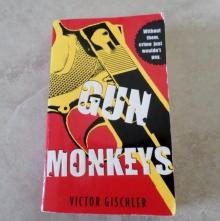 Gun Monkeys
Gun Monkeys Go-Go Girls of the Apocalypse
Go-Go Girls of the Apocalypse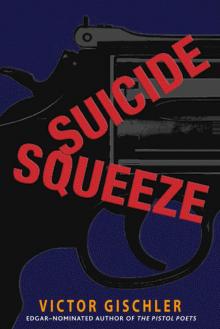 Suicide Squeeze
Suicide Squeeze The Pistol Poets
The Pistol Poets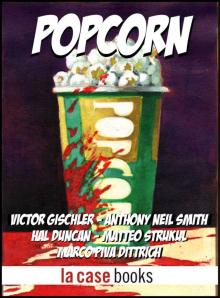 POPCORN
POPCORN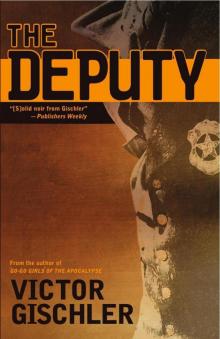 The Deputy
The Deputy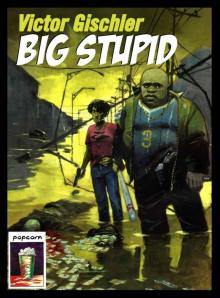 Big Stupid (POPCORN)
Big Stupid (POPCORN) Pistol Poets
Pistol Poets Shotgun Opera
Shotgun Opera The Tattooed Duchess (A Fire Beneath the Skin Book 2)
The Tattooed Duchess (A Fire Beneath the Skin Book 2) Ink Mage
Ink Mage Go-Go Girls of the Apocalypse: A Novel
Go-Go Girls of the Apocalypse: A Novel Stay
Stay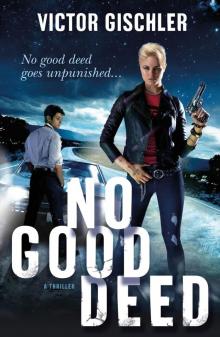 No Good Deed
No Good Deed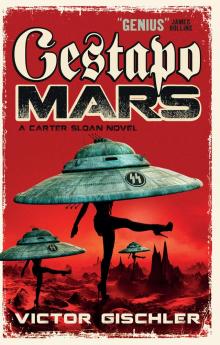 Gestapo Mars
Gestapo Mars A Painted Goddess
A Painted Goddess